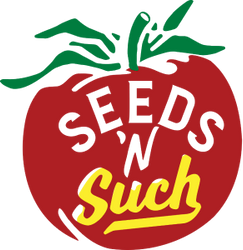
How To Choose Which Seed Types Are Best For You
Especially for inexperienced and first-time gardeners, choosing which seeds are best for your gardening needs can be quite frustrating when you see such common descriptive terms as “open-pollinated, heirloom or hybrid” appearing throughout our catalog. For those unfamiliar with these seed types, we thought it would be helpful to define them and assist you in deciding which types would better fit your gardening situations.
“Open-pollinated” means that these seeds come from plants where nature does the pollinating by wind, bees, flies, etc., with no intervention by humans. Almost all the seeds produced by plants germinated from open-pollinated seeds exhibit similar or exactly the same growth traits as the parent plants. For gardeners who wish to select and save their own seeds from season to season, open-pollinated varieties are the best choice to maintain variety stability.
“Heirloom” seeds are always open-pollinated varieties, and are usually saved by regional gardeners and passed down generation to generation. The added advantage to planting heirloom, open-pollinated varieties is that they contain all the nature-added genetic information that helps plants better adapt to climate and environmental change, pest pressure, etc. Heirloom varieties that have been passed down for many generations often contain considerable, desirable genetic data that provide strong growth characteristics for gardeners wishing to grow without the use of chemical pesticides or fertilizers.
“Hybrid” seeds are normally those produced with pollination intervention by humans although hybrid varieties can occasionally occur in nature. Humans can simply select two very healthy plants of varieties in the same family—tomatoes, peppers, melons, etc.—then carefully mechanically transfer (perhaps using an artist’s paintbrush) the pollen from male flowers of one type to newly opened female flowers of the other type.. You must then keep the cross-pollinated female from receiving additional pollen by covering it in plastic bag until the fruit begins to develop, and the bag can be removed.
Saved seeds from these selected fruits can then be planted the following season as what is defined as an F1-hybrid crop, and most of the offspring should demonstrate the combined strongest characteristics of the two parent varieties. This is particularly beneficial in gardens where pest pressure and diseases are widespread, allowing gardeners to select their strongest resistant varieties for cross-pollination. Another useful hybrid tool is to cross-pollinate for dwarfness, resulting in shorter, more compact plants for containers or limited gardening space.
The major disadvantage of hybrids is that if seed-savers plant their next F2 generation of seeds, they will find a dramatic diversity of plant forms. Normally there is approximately 25 per cent that will demonstrate traits similar to the original F1 planting, 50 per cent that revert back to traits similar to each of the parents selected for the original cross, and 25 per cent of very diverse variations of the two parents. Some very innovative gardeners like to select from F2 hybrid crops and then keep planting and selecting again and again until they develop their own locally-adapted, open-pollinated variety. Most of us simply order new hybrid seeds for planting each season.
Hybrids are totally different than more recent industry-promoted, genetically-engineered seeds or GMO (genetically-modified organism) seeds. Human intervention in GMO seeds is dramatic with the mechanical insertion of not only genes of different families of plants, but also the insertion of animal genes into plants, resulting in seeds that could never normally be created by Mother Nature. The actual testing for the effects of GMOs on humans and the environment has been quite limited, especially on a long-term scale, so there is much controversy among scientists regarding their dangers or benefits.
There is no doubt, however, that Mother Nature has declared all-out-war on GMOs, by creating “super weeds,” resistant to the GMO herbicides. This has forced their creators to develop new seeds with additional and stronger chemical engineering, resulting in even more chemical residues added to our food supply. We at Seeds ‘n Such feel that there is a serious lack of peer-reviewed, scientific evidence supporting the safety and benefits of GMO seeds. Until that evidence is provided, we pledge to not knowingly sell any GMO or chemically-treated seeds in our catalogs.
